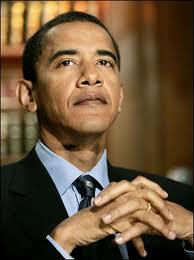Obama’s Game

I was away in Europe when President Obama delivered his third State of the Union Address, hence a belated commentary.
Obama’s carefully crafted speech sounded more like the opening shot in the reelection race than a set of serious policy proposals. His “blueprint for the future,” which supposedly will bring about a new era of social and economic revival, was vague and—significantly—contained no reference to the reduction of the $17 trillion debt. His insistence that an economic recovery is finally under way was misleading and predictably mendacious.
In view of his ideological and cultural preferences, it was irritating to hear Obama muse on “the American Dream” and call for “a return of American values of fair play and shared responsibility.” His demand that “Wall Street plays by the same rules as the rest of the country … with no bailouts, no handouts, and no cop-outs” made it sound like he had nothing to do with the biggest bailout in the history of the world. He blamed the bankers, China’s unfair trading practices and his predecessor for the high unemployment rate, while taking credit for the modest improvement of recent months.
On the foreign front—according to Obama—“the United States is safer and more respected around the world. For the first time in nine years, there are no Americans fighting in Iraq. For the first time in two decades, Osama bin Laden is not a threat to this country. Most of all, Al Qaeda’s top lieutenants have been defeated. The Taliban’s momentum has been broken, and some troops in Afghanistan have begun to come home.”
The most significant foreign event of the past year has been the misnamed Arab Spring, heartily supported by the Obama Administration, which has changed the geopolitical equation in North Africa and the Middle East to America’s detriment. The United States is not “safer” with the predictable triumph of the Muslim Brotherhood and its various affiliates in Egypt, Tunisia and Libya, and America will be even less safe if the relentless campaign against the Syrian regime is ultimately successful. Although clear to everyone but Obama, Muslim countries that oppose autocratic regimes stem not from secular reformers, but from true believers who accuse those regimes of betraying the “True Faith.”
As for the “respect,” Obama’s support of the regime changes in Cairo, Tripoli, Tunis and Damascus has not improved America’s standing in the Arab world. This is unlikely to change in view of his statement that “[o]ur ironclad commitment—and I mean ironclad—to Israel’s security has meant the closest military cooperation between our two countries in history.” In fact, an “ironclad commitment” of this kind is unhealthy for both parties.
“There are no Americans fighting in Iraq,” but Obama has failed to mention the sharp escalation of violence and all-pervasive instability in the country following the withdrawal of American troops. The manner of that withdrawal displayed an unsureness of touch, and a full-blown civil war remains a distinct possibility. Iraq has been a disaster for the United States, Iraqis, and the stability of the region. Obama’s undignified disengagement—too late to stop the deaths and suffering, too early to secure stability—has created a more volatile situation, which in the long run will be more detrimental to U.S. interests. Unspoken proxy wars by the Iranian Revolutionary Guard Corps (IRGC) have secured the greater degree of control over Iraq ever since the Persians ruled Mesopotamia. We saw a similar result in Lebanon.
Obama’s claim that “the Taliban’s momentum has been broken” is belied by the December 2011 National Intelligence Estimate (NIE) on Afghanistan, which warned that the “gains” have been undercut by “pervasive corruption” and that the war is still essentially a stalemate. The NIE also concluded that the Taliban remain undefeated and determined to re-impose their brand of Islamic rule on the country. It should be known that the NIE is the consensus view of the Central Intelligence Agency (CIA), as well as 15 other agencies and is more trustworthy than Obama’s rosy assurances. Moreover the “State of the Taliban”—a classified NATO report based on interrogations of thousands of captured Taliban prisoners—seems equally more credible than Obama’s declaration. Once the coalition withdraws, “the Taliban considers victory inevitable,” according to a BBC excerpt of the report.
On Iran, Obama declared that “[t]hrough the power of our diplomacy, a world that was once divided about how to deal with Iran’s nuclear program now stands as one. The regime is more isolated than ever before; its leaders are faced with crippling sanctions; and as long as they shirk their responsibilities, this pressure will not relent. Let there be no doubt: America is determined to prevent Iran from getting a nuclear weapon, and I will take no options off the table to achieve that goal.”
It is ironic that our Nobel Laureate President is seemingly unable to grasp the strategic logic of the Iranian bid for the bomb and prefers to parrot George W. Bush’s mantra that “all options” must remain open. Instead of threatening a military action against Iran with no clear exit strategy and at a prohibitive cost to our core interests, Obama would be well advised to engage Tehran in bilateral diplomacy based on an offer of U.S. security guarantees to Iran in return for a rigorous supervision regime and a formal pledge that Iran refrain from developing nuclear weapons. A reasonable agreement is possible, but Obama’s language offered no assurances that it will be sought or reached.
The most depressing part of Obama’s speech was his repetition of Madeleine Albrigtht’s mantra that “America remains the one indispensable nation in world affairs” (“as long as I am President I intend to keep it that way”). Such millenarian hubris has cost America and the rest of the world dearly over the years. Another war is to be greatly feared by year’s end.

